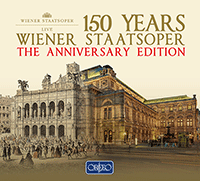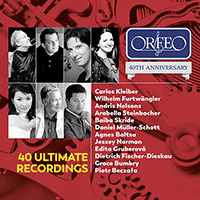Edita Gruberová
Although born in Bratislava, Edita Gruberová was the child of a Hungarian mother and German father. She studied music at the Bratislava Academy, where her singing teacher was Mária Medvecká, and continued her studies at the Bratislava Academy of Performing Arts. While there she became a member of the Lúčnica folk ensemble, which performed occasionally at the Slovak National Theatre in Bratislava. Having made her operatic stage debut in 1968 with the Bratislava Opera as Rosina / Il barbiere di Siviglia, Gruberová won the International Singing Competition of Toulouse, after which she was a member of the opera ensemble of the Tajovský Theatre in Banská Bystrica, Slovakia between 1968 and 1970.
During the summer of 1969 Mária Medvecká arranged for Gruberová to audition at the Vienna State Opera, which resulted in her engagement to sing the Queen of the Night / Die Zauberflöte in Vienna in 1970, when she achieved immediate recognition as a coloratura soprano of note. She left Slovakia, then under Communist rule, for the West, and initially was based in Vienna, becoming a member of the Vienna State Opera in 1972. There she built up an impressive repertoire of major bel canto roles in the operas of Bellini, Donizetti and Rossini, and firmly established herself as a major star with her portrayal of Zerbinetta / Ariadne auf Naxos in 1976.
Gruberová was also quickly active internationally: in addition to guest performances at Cologne, Hamburg, Frankfurt and Munich (including the title role in Massenet’s Manon) she made her debut at the Glyndebourne Festival as the Queen of the Night in 1973 and at the Salzburg Festival in 1975 as Konstanze / Die Entführung aus dem Serail. Later roles at Salzburg included Thibault / Don Carlo under Herbert von Karajan (1976–1978), Zerbinetta / Ariadne auf Naxos (1979–1982) and Donna Anna / Don Giovanni (1990), as well as numerous appearances in concerts and song recitals.
In 1977 Gruberová first appeared at the Metropolitan Opera, New York (as the Queen of the Night) and returned as Zerbinetta (1979), Lucia / Lucia di Lammermoor (1988), Violetta / La traviata (under Carlos Kleiber, 1989) and Elvira / I puritani (1991). Her debut at La Scala, Milan came as Konstanze in 1978, followed by Zerbinetta and Lucia in 1984, Donna Anna in 1987 and the title role in Linda di Chamounix in 1998. She made her debut at the Royal Opera House, London in 1984 as Giulietta / I Capuleti e i Montecchi with Riccardo Muti conducting, and returned to sing Zerbinetta in 1987, Lucia in 1988 and Giunia / Lucio Silla in 1991.
1986 saw Gruberová’s debuts at both the Chicago Lyric Opera (as Lucia) and the Bregenz Festival (Elvira). During the later 1980s and throughout the 1990s and 2000s her career was concentrated upon major European opera houses such as those of Barcelona, Munich, Vienna and Zürich in demanding bel canto roles that included Elisabeth / Roberto Devereux, Marie / La Fille du Régiment and the title roles in Anna Bolena, Beatrice di Tenda, Linda di Chamounix, Lucrezia Borgia, Maria Stuarda, Norma and Semiramide. In 1981 she appeared as Gilda in Jean-Pierre Ponnelle’s film of Rigoletto, which also starred Luciano Pavarotti.
Gruberová’s extraordinary vocal accuracy, range, volume and flexibility made her in many ways the successor to Joan Sutherland in the field of bel canto opera. She dominated the European stage in roles requiring these rare characteristics, singing these, and many others, with great technical accuracy and remarkable dramatic insight, creating a compelling stage presence. She also possessed great skill as a comedienne. Gruberová appeared on a large number of recordings, both made in the studio and taken from live performances.
© Naxos Rights International Ltd. — David Patmore (A–Z of Singers, Naxos 8.558097-100).
































